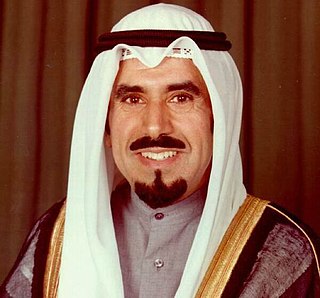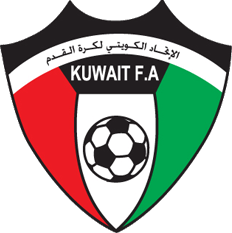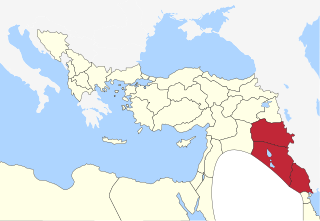Related Research Articles

The Patriotic Union of Kurdistan is a political party active in Kurdistan Region and the disputed territories in Iraq. The PUK describes its goals as self-determination, human rights, democracy and peace for the Kurdish people of Kurdistan and Iraq. The PUK is currently under the leadership of Bafel Talabani. The PUK was founded in 1975 by Jalal Talabani, Nawshirwan Mustafa, Fuad Masum, Adel Murad, Ali Askari and Abdul Razaq Feyli Dawood Mohammed Ali. All presidents of Iraq under the 2005 constitution have been from this party.

Sheikh Jaber Al-Ahmad Al-Jaber Al-Sabah or Jaber III was Emir of Kuwait from 31 December 1977 until his death in 2006.

The Kuwait national football team is the national team of Kuwait and is controlled by the Kuwait Football Association. Kuwait made one World Cup finals appearance, in 1982, managing one point in the group stages. In the Asian Cup, Kuwait reached the final in 1976 and won the tournament in 1980.

Abu’l-ʿAbbās Aḥmad ibn Jaʿfar ibn Muḥammad ibn Hārūn al-Muʿtamid ʿalā’Llāh, better known by his regnal name al-Muʿtamid ʿalā ’llāh, was the caliph of the Abbasid Caliphate from 870 to 892. His reign marks the end of the "Anarchy at Samarra" and the start of the Abbasid restoration, but he was largely a ruler in name only. Power was held by his brother al-Muwaffaq, who held the loyalty of the military. Al-Mu'tamid's authority was circumscribed further after a failed attempt to flee to the domains controlled by Ahmad ibn Tulun in late 882, and he was placed under house arrest by his brother. In 891, when al-Muwaffaq died, loyalists attempted to restore power to the Caliph, but were quickly overcome by al-Muwaffaq's son al-Mu'tadid, who assumed his father's powers. When al-Mu'tamid died in 892, al-Mu'tadid succeeded him as caliph.

Aḥmad ibn ʽAlī al-Rifāʽī was a Sunni Muslim preacher, ascetic, mystic, jurist, and theologian, known for being the eponymous founder of the Rifaʽi tariqa of Islam. The Rifaʽi order had its greatest following until it was overtaken by the Qadiri order. The Rifaʽi order is most commonly found in the Arab Middle East but also in Turkey, the Balkans and South Asia.

Kajal Ahmad is a contemporary Kurdish poet and journalist, known for the show Dijebaw on Kurdsat. She started writing poetry in 1987.
Shaykhism is a term used by Shia Muslims for the followers of Shaykh Ahmad in early 19th-century Qajar Iran. While grounded in traditional Twelver Shiʻi doctrine, Shaykhism diverged from the Usuli school in its interpretation of key ideas such as the nature of the end times and the day of resurrection, the source of jurisprudential authority, and the proper hermeneutic to be employed in interpreting prophecy through the mystical writings of the Twelver Imams. These divergences resulted in controversy and ongoing accusations of heresy from Usulis and Akhbaris.

Abdul Qadir Gilani was a Hanbali scholar, preacher, and Sufi leader who was the eponym of the Qadiriyya, one of the oldest Sufi orders.
Iraqi Biradri is a Sunni Muslim caste found chiefly in Ghazipur, Azamgarh, Ballia, Deoria and Gorakhpur districts of the eastern Uttar Pradesh in India. Iraqi Biradri is also referred to as Iraqi Shaikh.

The Mamluk dynasty of Mesopotamia was a dynasty of Georgian Mamluk origin which ruled over Iraq in the 18th and early 19th centuries.

Iraq al-Manshiyya was a Palestinian Arab village located 32 km northeast of Gaza City. The village contained two mosques and a shrine for Shaykh Ahmad al-Arayni. It was depopulated after the 1948 Arab-Israeli War.

Ministry of Foreign Affairs of the Republic of Iraq is a cabinet ministry of Iraq, responsible for conducting foreign relations of the country.
Abu Ahmad Ṭalḥa ibn Jaʿfar ibn Muḥammad ibn Hārūn al-Muwaffaq bi'Llah, better known by his laqab as Al-Muwaffaq Billah, was an Abbasid prince and military leader, who acted as the de facto regent of the Abbasid Caliphate for most of the reign of his brother, Caliph al-Mu'tamid. His stabilization of the internal political scene after the decade-long "Anarchy at Samarra", his successful defence of Iraq against the Saffarids and the suppression of the Zanj Rebellion restored a measure of the Caliphate's former power and began a period of recovery, which culminated in the reign of al-Muwaffaq's own son, the Caliph al-Mu'tadid.
Ahmad Abdul-Jabar is an Iraqi former Iraq national football team football player who is currently manager of Al-Karkh SC.

The Kurdistan Democratic Party, usually abbreviated as KDP or PDK, is the ruling party in Iraqi Kurdistan and the senior partner in the Kurdistan Regional Government. It was founded in 1946 in Mahabad in Iranian Kurdistan. The party states that it combines "democratic values and social justice to form a system whereby everyone in Kurdistan can live on an equal basis with great emphasis given to rights of individuals and freedom of expression."
On January 15, 2010, the Department of Defense complied with a court order and published a list of Captives held in the Bagram Theater Internment Facility that included the name Ahmad Dilshad.
The National Progressive Front was an Iraqi popular front announced on 16 July 1973 and constituted in 1974, ostensibly formed within the framework of a "joint action programme" to establish a coalition between the Arab Socialist Ba'ath Party, the Iraqi Communist Party, the Kurdistan Revolutionary Party, a pro-government section of the Kurdistan Democratic Party, and miscellaneous independents. The Iraqi Communist Party were removed from the NPF in 1979 while the Kurdish Democratic Party suffered restrictions when Saddam Hussein came to power after 1979. The creation of the Front ensured the leading role of the Ba'athists in state and society whilst allowing limited autonomy for other participating parties loyal to the government. Saddam spoke of it once as "one of the essential forms to voice our will and to deepen democracy and political participation of the people and the national forces in building the new experiment in all fields." In effect the Front was controlled and maintained solely by the Ba'ath, with all other legal political forces acting in subservience to it.

Ahmad Jassim Mohammed is an Iraqi football goalkeeper who played for Iraq in the 1986 FIFA World Cup. He also played for Al-Rasheed Club.

Ahmed Barzani revolt refers to the first of the major Barzani revolts and the third Kurdish nationalistic insurrection in modern Iraq. The revolt began in 1931, after Ahmed Barzani, one of the most prominent Kurdish leaders in southern Kurdistan, succeeded in unifying a number of other Kurdish tribes. The ambitious Kurdish leader enlisted a number of Kurdish leaders into the revolt, including his young brother Mustafa Barzani, who became one of the most notorious commanders during this revolt. The Barzani forces were eventually overpowered by the Iraqi Army with British support, forcing the leaders of Barzan to go underground.
References
- ↑ "قاعدة بيانات لاعبي المنتخبات العراقية-1". niiiis.com. Retrieved 25 September 2019.
- ↑ "Iraq – Record International Players". RSSSF .